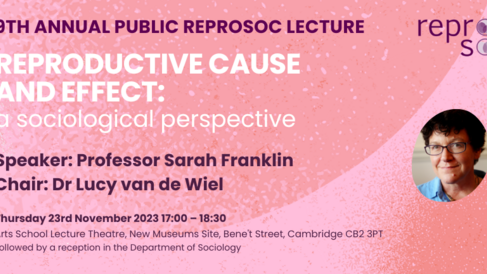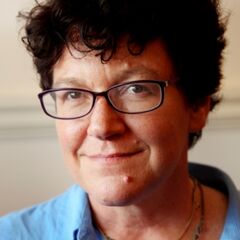9th Annual Public ReproSoc Lecture 2023 REPRODUCTIVE CAUSE AND EFFECT: A SOCIOLOGICAL PERSPECTIVE

Thursday 23 November, 17:00 – 18:30 | Arts Lecture Theatre, New Museums Site | Followed by a reception in the Sociology Seminar Room
Speaker: Professor Sarah Franklin
Chair: Dr Lucy van de Wiel
In anticipation of its transition to a virtual network, this lecture looked back at the work of the Reproductive Sociology Research group over the past decade from the point of view of how we understand reproductive cause and effect.
Initially the lecture considered some of the intriguing parallels in how dominant models of reproductive causality have been reversed in both the social and the life sciences over the past two decades.
In the second half the lecture looked at specific sociological examples of cause and effect ‘reversals’, many of them taken from the work of ReproSoc researchers.
The lecture concluded by arguing that sociology offers us a specific vantage point on reproductive causality, and that, as a system of relations, reproductivity also has lessons for how we understand causality in sociological terms.
As ever, the lecture featured sheep, poetry, bad puns, made-up repro words and scenes of collective cake consumption.
Professor Sarah Franklin
Sarah Franklin is a Professor of Sociology at the University of Cambridge, a Fellow of Christ's College, Director of the Reproductive Sociology Research Group (ReproSoc), a Wellcome Trust Senior Investigator, Chair of the Anne McLaren Trust and Director of LGBTQ+ @Cam.
Sarah Franklin has helped to establish several new fields in the social sciences including the 'new kinship studies', the social study of new reproductive technologies, and the cultural analysis of bioscience, biomedicine and biotechnology.
She has had research funding from numerous bodies including the Wellcome Trust, ERC, ESRC, MRC, British Academy, Philomathia Foundation, Wenner Gren Foundation, Carnegie Foundation and Mellon Foundation, among others.
Franklin's current research concerns the early history of UK IVF and she has worked closely with colleagues in the history of science as well as reproductive biology to develop new interdisciplinary approaches to the study of the intersection between reproduction and technology. Through her work on IVF, Franklin has developed new theories of both biology and technology, focussing on the use of biological tools, and the relativization of the category 'biological'. This model, of biological relativity, is the subject of her most recent book and builds on her previous introduction of the terms 'transbiology', 'embodied progress', and 'hope technologies'.
ReproSoc
The Reproductive Sociology Research Group was established in October 2012 to develop and support funded research on the technological transformation of reproduction and related forms of social and cultural change.
Based in the Department of Sociology, ReproSoc has raised over £10m in funding since 2013 from the Wellcome Trust, British Academy, ESRC, ERC, Leverhulme Trust and other funding bodies.
ReproSoc’s research covers a broad range of topics including the history of IVF, ‘repronationalism’, reproduction and the environment, reproductive justice, visual cultures of reproduction, non-heterosexual parenting aspirations, regenerative medicine, the IVF-stem cell interface, racialized reproduction, and reproductive inequality.
Their activities have included a programme of visiting speakers, public lectures, workshops, conferences and other public events, as well as a Visiting Scholars programme, an MPhil student programme, and Affiliated Scholars from within and outside Cambridge. ReproSoc members organise regular readings groups, research workshops, films, skills training sessions, brown bag lunches, talks and small conferences.
By developing new sociological approaches to the intersection of reproduction and technology, ReproSoc’s aim is to develop more generalizable claims about, for example, changing definitions of nature and ethics, the biologization of technology, translational biomedicine, and the political economy of reproduction. Their work thus contributes to sociology and anthropology, science and technology studies, social and oral history, feminist and queer theory, and the social study of biomedicine, bioscience and biotechnology, as well as other fields.

